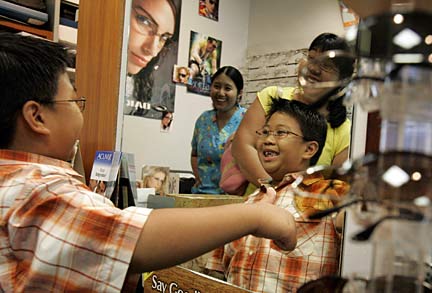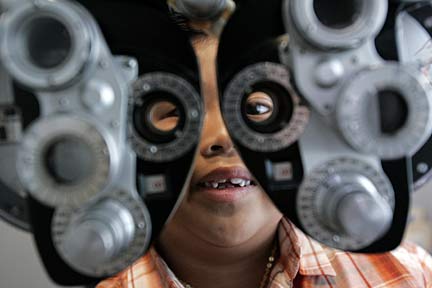
|
Kids lack eye care
Hawaii does not require students
to have eye exams, even though
poor vision impairs learning
The 6-year-old aced the eye chart on the wall across the room, reading the small print on the bottom line perfectly.
Free exams offered
|
Which means it's blurry, interpreted Dr. Linda Arakaki, giving the boy an exam at Eye Care Associates of Hawaii, 1441 Kapiolani Blvd.
Asked if he likes to read, Ian, son of Emelda and Lyndon Godoy of Kalihi Valley, shook his head no. He plays basketball and likes "the playground" best at school, he said.
"For kids, if it's stressful for close work, avoidance of reading can be a symptom," Arakaki said.
President of the Hawaii Optometric Association, she said comprehensive vision exams are recommended for children, especially those entering preschool and kindergarten.
But Hawaii is one of 19 states that don't require any preventive eye care for school-age children.
At one time, Hawaii had a school vision screening program under the Department of Health, but it was discontinued because of lack of funding, Arakaki said.
She said the Hawaii Optometric Association supports a law mandating eye exams for children entering school because "oftentimes, diagnosing a vision problem early on in life may help in detecting early vision problems and also prevent early learning problems.
"If a child cannot see, he cannot read and therefore cannot learn."

About 60 percent of students identified as problem learners nationally have undetected vision problems, according to the American Optometric Association.
Ian's parents took him for an eye exam before he started school and the exam last week was a follow-up, his mother said.
"Growing children, as their eyes develop, sometimes need help for up-close focusing," Arakaki said. "We pick this up at this age. It was a good time to bring him in."
She questioned Ian while examining his eyes, asking if they were ever painful, red or watery and whether he got headaches or squinted in the sun.
One test, she explained, was to make sure his eyes were straight and work together.
She said Ian's eyes are healthy, but he's farsighted, a condition known as hyperopia. She recommended glasses for reading, doing homework and watching TV.
That didn't make the Kalihi Uka first-grader too happy, saying he "would be embarrassed" to wear glasses at school.
No child wants to wear glasses, Arakaki said. "Part of our job is to educate them that our glasses are our friends and help us."
"You look like a genius," Ian's mother said as he tried on different frames, looking at himself in the mirror. "You can read better. We can read more books."
His favorite, he said, is "the dinosaur book."
Arakaki plans to see Ian again in three months to follow up on how he's doing with his glasses.
Teachers also have been asked to track children in school to see how well they're reading, she said.
Arakaki said the Hawaii Optometric Association is working with Hawaii Rotary Clubs to conduct vision screening in schools. "Our goal is to do all of them."
But screening isn't as good as a comprehensive eye exam, she pointed out. "The purpose is to pick up gross visual defects, in terms of something obviously not correct, but it's in the right direction of getting a comprehensive eye exam."
Kentucky is the only state with a law requiring vision exams for children entering school, which can be done by an optometrist or ophthalmologist.
The results, according to the Kentucky Optometric Association: Vision problems are detected in 10 percent of preschoolers and 25 percent of children in kindergarten through sixth grade.
The Vision Council of America in a report, "Making the Grade," found two out of three children do not receive vision care before starting school and 86 percent of children 12 and under have never had an eye exam.
The U.S. Centers for Disease Control and Prevention in a recent study found impaired vision can affect a child's cognitive, emotional, neurological and physical development.
E-mail to City Desk
[News] [Business] [Features] [Sports] [Editorial] [Do It Electric!]
[Classified Ads] [Search] [Subscribe] [Info] [Letter to Editor]
[Feedback]
